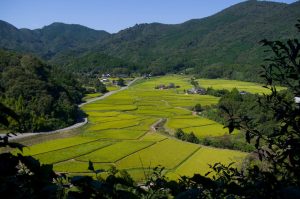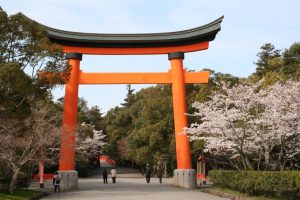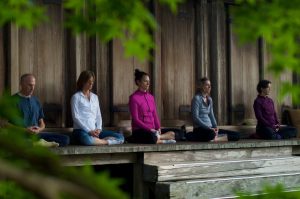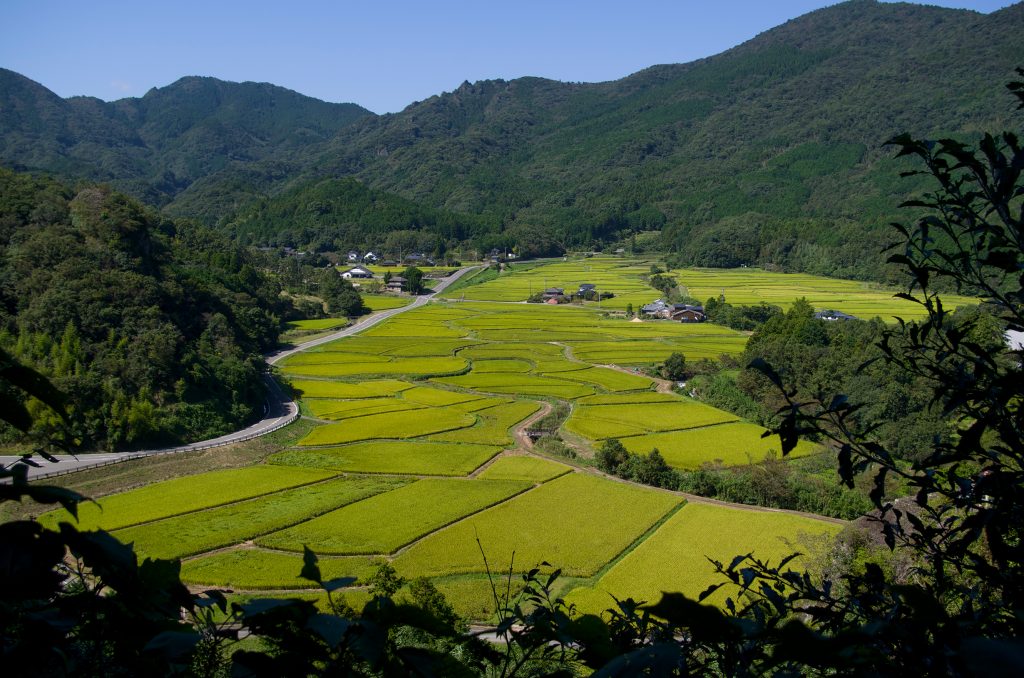Media Contact:
Margot Black
margot at blackinkpr.com
323-876-5006
BlackInk PR



EXPLORE THE STORIED PAST OF JAPAN’S KUNISAKI PENINSULA WITH WALK JAPAN
[September 2019] Walk Japan specialises in authentic and enjoyable tours of Japan. Small-group, guided and self-guided walking tours venture through lesser-known areas of the country, and celebrate the culture, rich history and gastronomy of one of the world’s most fascinating lands.
The Kunisaki Peninsula is nestled into the western end of Japan\’s Inland Sea on the island of Kyushu. The peninsula is a beautiful relatively undiscovered area, with few Japanese and even fewer foreigners aware of its existence. Modern Japan has left this quiet haven of rural life largely untouched. For many centuries though, it was an important centre of Shugendo which is an amalgamation of the indigenous, animistic Shinto religion and Buddhism, which was brought from China and Korea. Kunisaki\’s once-powerful religious institutions are long gone, however, the region is dotted with delightful temples and wayside shrines, reminders of its deeply religious past.
The Kunisaki Peninsula features on three Walk Japan tours; the Kunisaki and Yufuin Walk, Kunisaki Retreat, and Kunisaki Trek. Each of these tours includes an enriching experience with Walk Japan’s Community Project, the company’s long-term sustainability initiative.
Kunisaki and Yufuin Walk (5 Days, 4 Nights, Activity Level 2)
Commencing at Fukuoka’s Hakata Station and finishing at Yufuin, this route is mainly on forest trails and provides an introduction to the Kunisaki Peninsula, one of Japan’s most beautiful yet least known areas, and Yufuin, one of Japan’s elegant onsen thermal hot spring resorts. The tour follows in the footsteps of monks, who have walked through the mountains of the peninsula for more than 1,200 years. The ancient trails provide excellent walking through sleepy hamlets, verdant forests, along craggy ridges and tower over the surrounding myriad valleys. En route, travellers pass by stone Buddha statues, large and small, and also caves where monks once found shelter and meditated. The tour visits Usa Jingu, one of the greatest but least known of Japan’s great shrines; walks through Tashibu, a lovely village in a bucolic setting; makes a short yet steep climb to two ancient Buddha relief carvings on the face of a towering cliff; and also climbs to Itsutsuji-Fudo, the inner sanctum and one of the few structures to remain of a once important and powerful temple. During the climb, great views open up of the surrounding mountains and valleys and in clear weather, across to the Seto Inland Sea, the route by which Buddhism first arrived in Kunisaki from China, and Japan’s main island, Honshu.
Customers stay on the peninsula for three nights at two different, delightful inns, both with onsen thermal hot spring baths. One is adjacent to Fuki-ji, one of Japan’s most beautiful temples. As with all Walk Japan tours, on the Kunisaki & Yufuin Walk you will be immersed in Japanese culture of the past and present, enjoy Japanese cooking at its best, luxuriate in hot springs and simply gaze at the beautiful scenery.
2019 dates: November 20-24, December 4-8.
2020 dates: March 30-April 3, 14-18, May 5-9, 28-June 1, 11-15, more online.
Prices from JPY234,000 (~AUD$3,251).
Kunisaki Retreat (7 Days, 6 Nights, Activity Level 1)
A mind and body tour in serene Kunisaki, the Kunisaki Retreat centres on the Kunisaki Peninsula with an emphasis on spiritual wellbeing. This tour is perfect for travellers who are keen to enjoy Japan in a relaxed fashion while closely interacting with the charming and friendly people of the country. Customers are guided through yoga, meditation, and gentle walks through rural scenery each day for a relaxing, spiritually engaging getaway. On most mornings, meditation is led by the young abbot of Fuki-ji, and a local instructor leads daily sessions of yoga other forms of body work. With its emphasis on local produce and cuisine, whether breakfast, lunch or dinner, dining here is an experience in itself.
Local farming is on a small scale and includes a variety of crops including rice, soba, soybeans, wheat and a myriad vegetables and fruit. These, along with local-caught fish, are the basis of the nutritious and tasty cuisine enjoyed each day. The Kunisaki Retreat also features activities such as making soba buckwheat noodles, ikebana flower arranging, chado tea ceremony, and Japanese taiko drumming.
2019 dates: September 22-28, November 18-24.
2020 dates: April 19-25, June 1-7, September 20-26, November 26-December 2.
Prices from JPY358,000 (~AUD$4,973).
Kunisaki Trek (10 Days, 9 Nights, Activity Level 4)
Walk Japan’s Kunisaki Trek follows in the footsteps of monks who have walked through the mountains of the peninsula for more than a thousand years. Mine-iri, the practice of traversing sacred mountain paths in prayer, has been part of the religious life of Kunisaki since the 9th Century. Although now rare, mine-iri still continues today in Kuniskai, one of only a few places in Japan where it still occurs.
Designed for experienced trekkers, the route along ancient trails lined with stone Buddha statues passes through sleepy hamlets, verdant forests, along craggy ridges and over towering cliffs to caves where monks once sheltered. The tour concludes in Yufuin, a small up-market town in the shelter of the imposing Mount Yufu-dake, a dormant volcano. Many onsen hot springs are found here and the town has some of the finest ryokan inns, that Japan offers.
As with all Walk Japan tours, customers are immersed in Japanese culture, enjoy Japanese cuisine, luxuriate in hot springs and soak up breath-taking scenery.
2019 dates: October 23-November 1, 13-22.
2020 dates: April 29-May 8, 8-17, June 3-12, September 30-October 9, more online.
Prices from JPY448,000 (~AUD$6,224).
An important part of Walk Japan’s commitment to Japan is its Community Project, set in Kunisaki, Kyushu in west Japan. The initiative was established in 2007 to support the communities of two small neighbouring rural valleys on the picturesque Kunisaki Peninsula maintain their society and environment with the long-term vision of providing the area with a sustainable and viable future. Here, efforts are centred on the company’s local office, set within a refurbished farmhouse reflecting the Project’s vision of helping to revive the delightful area.
The project comprises initiatives such as: providing much needed local employment; undertaking farming and forestry, which are both in decline due to an ageing and declining workforce; refurbishing empty properties to provide them with new leases of life as accommodation and offices; maintaining communal land such as parks, which were otherwise uncared for; creating and sponsoring community events; and encouraging visitors both Japanese and from overseas to the area.
The Community Project complements Walk Japan tours, which primarily visit lesser-known regions throughout Japan and impact local communities in positive and sustainable ways by being composed of small-groups that use family-run business, such as inns and restaurants, and, whenever practical, public transport.
Osaka-born Takahiro Ito leads Walk Japan’s Community Project. Ito gained an interest in sustainable tourism development and community revitalisation while visiting the rural region of Surin in Thailand. Here, he helped to renovate primary schools and reinvigorate the community. Following his graduation from Ritsumeikan Asia Pacific University with a Bachelor in Hospitality & Tourism, Ito joined Walk Japan to lead the Community Project in 2018.
About Walk Japan
National Geographic has described Walk Japan as “one of the 200 Best Adventure Travel Companies on Earth”. The company leads the way in providing the most fulfilling and enjoyable tours available in Japan. Walk Japan has an unrivalled range of regular, scheduled tours for Japan and is researching more for the future. It also creates and runs private, custom tours tailored to customers’ particular interests and requirements. These include private tours for families, friends, societies, companies and schools.
Founded in 1992 by two academics, Dr. Thomas Stanley and Prof. Richard Irving, the company has since grown considerably both in its number of tours and customers to become the acknowledged leader of specialised tours that immerse visitors in Japanese society and culture; provide great insights into the nation and its people; and often explore little-visited, beautiful and diverse regions of the nation.
Based in rural Kyushu, Walk Japan actively operate in a way that recognises the important role and responsibilities that business has in society. This means being committed to and supportive of the communities in which they operate and ensuring that their tours have a positive impact in these areas. Wherever possible Walk Japan uses and supports family-run and local businesses.
For more information, visit walkjapan.com
For images, visit Walk Japan’s media suite


